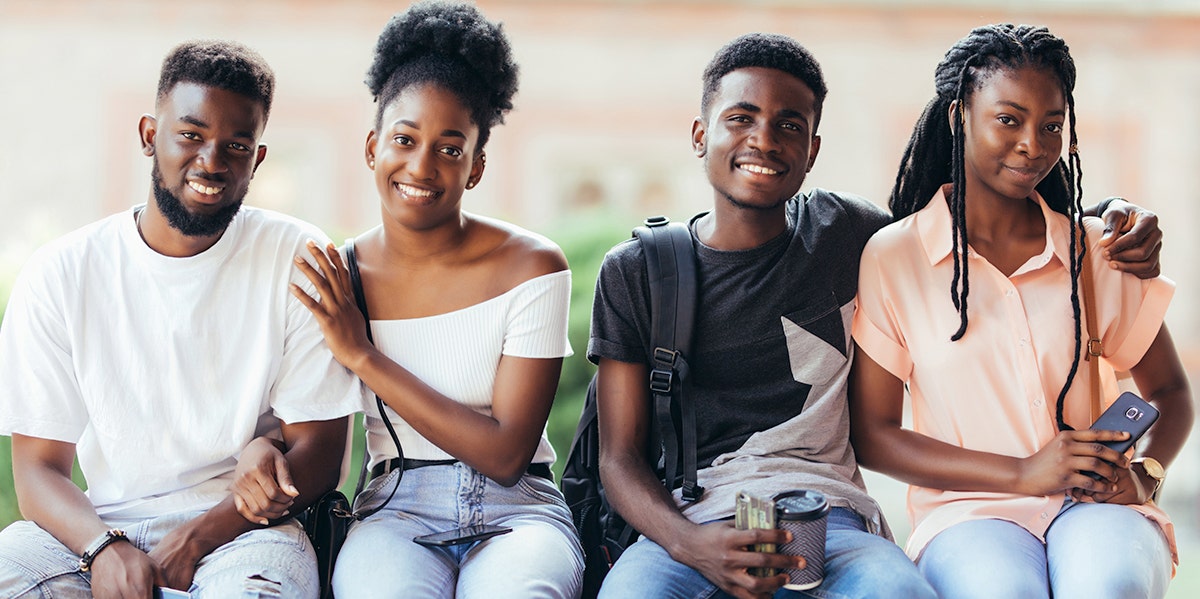Why I Think Black People Can't Be Racist – Even Though Some Black Scholars Disagree With Me
We need to understand the difference.
 F8 studio / Shutterstock
F8 studio / Shutterstock It seems as if the conversation surrounding race in America and who reaps the benefits — as well as the repercussions — of systemic racism in this country is one we're having more often: that's a good thing.
Many would agree that the majority of power in this country belongs to white people, given its history rooted in slavery and the fact that our system is designed to uplift and cater to the development of white people while BIPOC are left to scrounge for their own.
And yet, many people are confused about who exactly gets to be racist, and who can be on the receiving end of racist comments.
To start: There's a huge difference between being prejudiced, being racist, and being discriminatory. And not every race can be all three — especially Black people.
Black people can be prejudiced by perpetuating transphobic, homophobic, and xenophobic behavior toward other people in marginalized communities. Black people can also be discriminatory when they behave that way toward other minority groups.
But Black people can't be racist towards white people, and here's why.
Racism is defined as a power structure that allows one group to put a system in place where they use their race to direct discrimination against people of a different race based on their belief that their own race is superior.
The ideology of racism is why the transatlantic slave trade was born, as well as the idea that white people are superior to Black people — so much so, that we were sold off and made into slaves.
Black people are often accused of being racist towards white people, but that's not a real thing because racism only exists within a power structure that systematically and institutionally rewards whiteness.
Black people cannot be racist toward the same people who are racist towards us. Reverse racism is not real.
“Racism requires the ability to deploy, or at least benefit from, power,” says Jamila Michener, an associate professor of government at Cornell University who researches racial inequality and poverty. “So people who can neither deploy nor benefit from power can’t be racist. They can be prejudiced, but they can’t be racist.”
For Black people to exhibit reverse racism means we must exercise power and authority: two qualities Black people don’t possess in this world.
Black people have never held significant power in this country, thanks to a long history of systemic racism in the United States.
To be sure, there are Black scholars who disagree with me.
Ibram X. Kendi, the author of How To Be An Antiracist, feels that Black people can, indeed, be racist.
In an interview with CNN, Kendi says, “You have Black people who believe that they can’t be racist because they believe that Black people don’t have power and that’s blatantly not true. Every single person on earth has the power to resist racist policies and power.”
People like Kendibelieve the Black community is able to hold power in this country and cite people like Barack Obama, Oprah Winfrey, and other Black leaders — but I think that's a lackluster argument.
Just because America has seen one Black president, and now Kamala Harris as our first Black and South Asian vice-president, doesn’t mean that all of a sudden every Black person in America is empowered.
Black people still get killed by the police. Black people still don’t get fair treatment within the justice system. Black people still only make up 5% of the medical field. Black people still live in poverty because our U.S. system holds them back from getting jobs. The list goes on and on.
One Black person’s success doesn’t dictate all of our successes — and it sure doesn’t erase the absolute trauma that is inflicted upon Black bodies on an everyday basis.
But let's revisit my earlier point: Black people can absolutely spew discriminatory and prejudiced statements. We cannot be excused for that. In fact, colorism is an example of discrimination within the Black community.
But I maintain that Black people cannot inflict racist practices against white people. We can be rude and offensive in things we say to white people, but white people will never know what it feels like to be oppressed for the color of their skin.
We have to look at systemic racism like a totem pole, where Black people are at the bottom and white people are at the top. The closer an individual is to whiteness, the more power that person has to be discriminatory towards Black people.
But asking whether a person of color can be racist is the wrong question, says Nitasha Sharma, an associate professor of African American studies and Asian studies at Northwestern University. “It’s not about our identities. It’s about our complicity with our systems of power,” Sharma says, meaning that a person of color can be racist if they work for an institution that upholds systemic racism.
There need to be more conversations surrounding race in this country and who exactly gets to reap the benefits of having power and authority because, in my opinion, it definitely isn’t Black people.
Nia Tipton is a writer living in Chicago. She covers pop culture, social justice issues, and trending topics. Follow her on Instagram.

